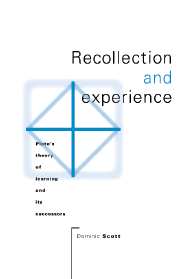Book contents
- Frontmatter
- Contents
- Acknowledgements
- Abbreviations
- GENERAL INTRODUCTION
- SECTION I PLATONIC RECOLLECTION
- SECTION II ARISTOTELIAN EXPERIENCE
- SECTION III HELLENISTIC CONCEPTS
- SECTION IV INNATISM IN THE SEVENTEENTH CENTURY
- Introduction
- 9 The inner core and mortar of our thoughts
- 10 Locke and the posture of blind credulity
- CONCLUSION
- Bibliography
- Index of ancient passages
- General index
Introduction
Published online by Cambridge University Press: 03 December 2009
- Frontmatter
- Contents
- Acknowledgements
- Abbreviations
- GENERAL INTRODUCTION
- SECTION I PLATONIC RECOLLECTION
- SECTION II ARISTOTELIAN EXPERIENCE
- SECTION III HELLENISTIC CONCEPTS
- SECTION IV INNATISM IN THE SEVENTEENTH CENTURY
- Introduction
- 9 The inner core and mortar of our thoughts
- 10 Locke and the posture of blind credulity
- CONCLUSION
- Bibliography
- Index of ancient passages
- General index
Summary
The seventeenth century has often been seen as the hey-day of innatism, and not without reason. We have already introduced some of the dramatis personae in chapters 3 and 8 – Descartes and Cambridge Platonists among the proponents of innatism, and, as its most famous critic, Locke, whose polemic in the first book of his Essay concerning Human Understanding prompted Leibniz to mount an elaborate defence in his New Essays on Human Understanding. But the theory was not confined to the philosophically illustrious, but was extremely popular with other thinkers as well, many of whom commanded influence both in universities and in the church. Seeing the foundations of morality and Christianity under threat, these thinkers were especially concerned with moral and religious principles and attempted to reverse the damage by appealing to principles allegedly stamped on our minds by the hand of Nature.
All those who contributed to this debate would have realised that it was one with an ancient pedigree. Leibniz admits as much in the preface of his New Essays on Human Understanding:
There is the question whether the soul in itself is blank like a writing tablet on which nothing has as yet been written – a tabula rasa – as Aristotle and [Locke] maintain, and whether everything which is inscribed there comes solely from the senses and experience; or whether the soul inherently contains the sources of various notions and doctrines which external objects merely rouse up on suitable occasions, as I believe and as do Plato and even the Schoolmen, and those who understand in this sense the passage in Saint Paul where he says that God's law is written in our hearts (Rom. 2: 15). The Stoics call these sources Prolepses, that is fundamental assumptions or things taken for granted in advance. (Remnant and Bennett (1982) 48–9)
- Type
- Chapter
- Information
- Recollection and ExperiencePlato's Theory of Learning and its Successors, pp. 223 - 224Publisher: Cambridge University PressPrint publication year: 1995



